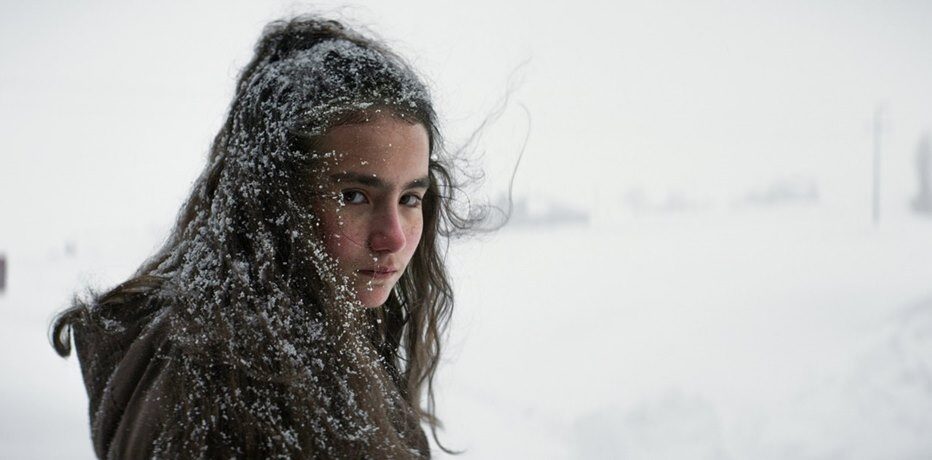Nuri Bilge Ceylan, director of the acclaimed Once Upon a Time in Anatolia (2011) and Winter Sleep which won the Palme d’or in 2014, has a film in competition at Cannes once again, About Dry Grasses. Located in rural Anatolia, the film opens with a snowy screen so bright and white and overexposed it’s practically blinding. The lead character, art teacher Samet, (Deniz Celiloğlu) comes onto the screen, returning from a trip visiting his parents, wearing all black and carrying a black suitcase, a visual juxtaposition and a great introduction to his sullen, moody character. He’s not a likable character, an antihero you take in with unease. He’s a man deeply unhappy with his life. Despite displaying moments of kindness, his cynicism weighs him down. He hates the isolated, impoverished town where he lives – “from the day I arrived I’ve only thought about leaving” he says, hoping to be able to transfer to a school in Istanbul.
He has a close relationship with one of his students, Sevim (Ece Bağcı), the prettiest girl in school who has the whole faculty wrapped around her finger. She visits his office that he shares with his best friend and colleague, Kenan (Musab Ekici) in her free time, complaining about her other classes. Their relationship sours quickly into the film when the students in his class are subjected to a bag check: amongst the confiscated items are a penknife, a laser pointer, a bracelet, a compact mirror (gifted to Sevim by Samet) and a love letter written by Sevim. Samet later finds his adult colleagues laughing at it, and he chastises them for their schadenfreude at the sake of a young girl. He intercepts the note and takes it back to his office, reading a few lines before being interrupted by Sevim herself. She demands the note back, and he tells her he has disposed of it and ripped it to shreds, attempting to comfort her, saying “Being in love is a wonderful thing. There’s nothing to be afraid of.” He reassures her that her feelings are pure and innocent. She doesn’t buy it. She sees right through him, and repeatedly demands her letter back, fuming. He loses his patience and temper at her unwillingness to accept his lies, and she storms out.
Soon after, Samet and Kenan are called into a meeting with the district head, who tells them he will be installing central heating to their school, which they already have. He corrects himself, and brings in a counselor. They reveal that the duo has been the subject of a complaint by students for inappropriate closeness, based on their behavior in the classroom. Samet and Kenan are outraged, and demand to know more information, which they do not receive. The district head reassures them that the complaint has been suppressed and shut down, Samet and Kenan are infuriated it wasn’t shut down before it even reached him. Samet reacts with cynicism, that you can “sling mud and see what sticks,” whereas Kenan is more offended on a personal level, asking “what about honor and dignity?” With digging around and a meeting with their principal, the pair learn that it was Sevim, and her friend Aylim, who made the complaint. Although the situation doesn’t escalate from there, Samet becomes extremely agitated. He lashes out at his class, particularly at Sevim, screaming at her, threatening expulsion, and sending her out of class.
About Dry Grasses is mostly dialogue based. Samet is constantly drinking tea and chatting with his fellow towns-folk, commiserating about the poverty and bleakness of their lives, engaging in passionate discussions with great, punchy dialogue. Some of the best conversations are between Samet, Kenan, and Nuray (Merve Dizdar), an English teacher in a neighboring town who lost her leg in a suicide bomber explosion due to her radical politics. An independent thinker with a biting spirit, she isn’t afraid to push back against the men, challenging their ideas and line of thinking. Originally introduced to Samet first, she takes more of an interest in Kenan. An amateur artist, she asks to take a picture of him, saying “at first it looks like an ordinary face, but there’s a great sorrow deep inside,” asking Samet to move his arm out of the frame. Although he may not show it, this perturbs something deep inside Samet, who takes stunning portraits in his spare time, shown as stills with slow Ken Burns style zooms. The cinematography, done by Kürşat Üresin and Cevahir Şahin, throughout the film is consistently alluring, with sprawling, expansive landscapes of the snowy, Turkish wilderness, as well as intimately framed shots of the characters interacting, with playful intriguing shallow focus.
By focussing in on such a contemptible protagonist, Ceylan posits a chicken-and-the-egg type of conundrum in terms of attitude and environment. Is he so hopeless and cynical because of the lack of opportunities and the cold, bleak, harsh weather and landscape, or does he just use it as an excuse? While watching, I couldn’t help but think about the line from Bong Joon Ho’s Parasite (2020) about how the wealthy Kim family matriarch is “not ‘rich but still nice.’ Nice because she’s rich.” Wealth is absent in the rural Anatolian town, and so is kindness. Kindness comes in hot flashes that evaporate as quickly as they appear, always with an ulterior motive. Kindness cannot be trusted, because optimism gets you nowhere in Samet’s world. Because of the situation, Samet’s attitude is entirely understandable and sympathetic, but doesn’t excuse his actions. What makes him unlikable is what makes him compelling. The runtime, at 197 minutes, is well paced, but lengthy, keeping you trapped in this stifling, isolated town, forcing you to understand exactly why Samet is so desperate to escape it.

